Why age is *much* more than the year you were born, according to Jillian Michaels
According to Jillian Michaels, what makes you age is more than the year you were born. Here, she talks about everything that determines your true age.

When anybody asks me how old I am, I don’t skip a beat: I’m 24. Just kidding—I’m older than that, but, essentially, I’m prewired to answer that question by stating the number of years that I’ve been on earth. What else would I say, anyways?
Well, according to Jillian Michaels, creator of the My Fitness app and author of the new book The 6 Keys, there’s so much more to age than that number. “You could look at somebody who’s 30 and has the liver of a 55-year-old, or conversely a 55-year-old with the liver of a 30-year-old,” says Michaels. “There are so many variables to age.”
The least of which is how old we all actually feel and what society expects of us given that proverbial clock over our heads. “Psychologically, age is how you feel and how you behave, which affects the things you do and, in turn, dramatically impacts the outcome of your life.” Sociologically, on the other hand, age has implicit expectations for what those around you expect you to be doing. “Like, if you’re 30, people can say, ‘Your clock is ticking, you should be married and have X number of kids,'” says Michaels. Ignore this factor at all costs, she adds.
So, essentially, your age is actually a measure of chronology, physiology, sociology, and psychology, she says. In order to increase your longevity while being the best you can for your age, keep scrolling for Michaels’ advice.
How to tap into your genetic potential, according to Jillian Michaels
Nail down when to eat: Intermittent fasting is a diet practice that’s been embraced by wellness gurus for a variety of benefits. Michaels, on the other hand, simply stresses that fasting is mainly important from sun-down to sun-up. “I would recommend a minimum of 12 to a maximum of 16-hour fasting period between dinner and breakfast,” she says. “It frees up your body to focus on housekeeping—culling dead cells to rebuild new ones, and minimizes oxidative stress, among other things.” Throughout the day, she advises to eat a meal every three to four hours—breakfast, lunch, snack, and dinner.
Get macronutrients: There are a vast range of eating plans out there—but Michaels says the most important thing is to get in your macronutrients. “Sometimes diets can be too extreme,” she says. “A balanced diet is where you should be. Don’t eat too much, don’t eat too little.” So what to eat? Michaels stresses the importance of healthy proteins, fats, and carbs—and that’s pretty much it.
Manage stress: Your state of mind can literally change the shape of your brain, says Michaels. “If you’re in a bad mindset or overwhelmingly stressed, you can get into these dark places,” she explains. “It literally shrinks your amygdala and hippocampus, which deal with emotional regulation and impulsivity—it’s real.” To deal, she advises to really look into how to mitigate emotional and psychological stress. “Try meditation, yoga, therapy, find better friends,” she says. All are fair game.
Maximize antioxidants: Free radicals aren’t just enemies of your skin—they affect your entire health. The antidote lies in antioxidants. “It’s key to look at ways to maximize antioxidants in your system,” says Michaels. “It goes beyond the macros of our diet. Look at B vitamins, superfoods, and resveratrol, for instance, to help combat oxidative stress.”
Devote time to sleep: As you know, sleep undermines everything from leading to anger (if you don’t get enough) and supplying better energy levels. It’s also, of course, key to your vitality. “Sleep is so massive, and the idea is to get no less than seven and no more than nine—over that is too much,” says Michaels. “That’s the sweet spot.”
Have a solid fitness regiment: Working out is good for you—that’s a given. But more benefits go into it than you probably realize. “Physical stressors put you in fight or flight mode,” says Michaels. “When you create mini-injuries through exercise, inflammation goes there to do the clean-up work and repair. When done right, you create the right amount of stress, make inflammation go in to rebuild and repair, so you’re getting fitter faster and for longer.”
Also, here are foods that slow down your metabolism, according to Jillian Michaels. And this is how she beats the afternoon slump.
Sign Up for Our Daily Newsletter
Get all the latest in wellness, trends, food, fitness, beauty, and more delivered right to your inbox.
Got it, you've been added to our email list.










